- Home
- Joy Dettman
Goose Girl Page 6
Goose Girl Read online
Page 6
Passionfruit were meant to be eaten fresh off the vine, cut in half, the pulp scooped out with a spoon. Or when they were old, a fingernail hole must be drilled and the contents sucked from the wrinkly sack. That’s how her father had eaten them in passionfruit season. But the season was winter and canned pulp on toast didn’t tempt her tastebuds. She chose the peanut butter, plastic, salt-free paste, and took her meal to the television; there she sat on the floor, eating toast, sipping coffee, thinking of Geelong and Raelene Mason and the passionfruit vines, a wall of green between the two houses. Strange flowers like purple/pink suns. From the squeak-squawking swing, she and Raelene had watched over the passionfruit that first year, watched the suns turn into hard green moons and grow fat, turning from green to purple.
A shake of her head dismissed Geelong. That was the past and this flat was her future.
Not much of a flat. Tonight the window was wet with condensation. Too much water in too little space and no ventilation. A kitchenette and its drip-dripping tap on one side of her front door and a tiny bathroom with its shower and toilet on the other, a living room/bedroom, a short bench, a long window, and all in an area no larger than a cheap motel room. Maybe that’s why she’d taken it – because it looked like a motel room. Book in, book out, and leave no self behind.
The wardrobe backed onto the kitchenette, which created a space on the other side for her fridge. There was a small electric heater beside the wardrobe, an energy guzzler. She rarely used it. Number 11 was just a place to sleep, and Bay 11 a place to park her car – not that black bikie’s Harley.
She’d bought her queen-size bed second-hand. A bad buy, it swallowed most of the living area, but it was warm with its quilt and electric blanket. She reached across now, turning the blanket control to number three. Give it fifteen minutes, time for another cup of coffee and a muesli bar, then she’d crawl into bed with Sue’s book.
Sue had a house full of books. She was Sally’s private lending library.
Thursday tomorrow. Another late night. Nothing better to do, though, and the extra hours turned a subsistence wage into something she could almost survive on while she searched for something better.
The supermarket where she’d worked for years had changed hands six months ago, the new owner employing his daughter as checkout chick. There was little work to be had in Lakeside. Sally could have got a job cleaning at the hospital but she loathed that place. She’d waitressed at the Royal Hotel for a while but Ross hadn’t approved, and he’d been pushing again for a wedding. Then she’d seen the ad in The Age, applied for the job and got it.
Her mother wasn’t happy, nor was Ross. Sally no longer knew if he was what she wanted or just what she had. Or maybe she’d always known and was too scared to admit it. Poor Ross, she’d wasted so much of his life.
She did love him. Couldn’t have handled Mummy’s little emergencies without him. Hated the way he had his hair cut. Hated the way he ate. Hated his nagging. But she did love him.
Loved him like she had when she was fourteen. Big brother love.
‘Sally Bertram,’ she said. ‘Sally De Rooze.’
She liked her name. It sounded tall, elegant. When she spoke her name on the phone she felt tall, but when people saw her in the flesh they saw the runt of the litter, held back from the teat of life. She’d reached her full height at thirteen, four foot eleven when stretched – an undergrown twenty-nine year old, suffering from a semi-permanent loss of direction, because every time she found a direction Mummy dropped a concrete block in front of her so she had to veer off and find a way around it.
‘Concrete-block time, Sall,’ she said.
A glance at the wall phone. Too late. She’d call the hospital tomorrow from work. A cigarette lit, she mind-travelled on until the nature show ended then, the remote pointed, she quick-flicked by cop shows, past hospital shows, until she found the news headlines.
Train crash in India. Gunman in Melbourne. Drug dealers in Bourke Street. Bleeding hearts demanding shooting-up centres, while most Melburnians were more worried about who was going to win the premiership.
What a crazy world. What a cold, fragmented city. A lonely place. Six times a week, and twice on Sunday, Sally decided to go home. She couldn’t break into Melbourne, except with Sue, who was a total nutcase but a collector of people. She had collected Sally, having swept her up from the tearoom floor at work one morning. ‘Can I bot a fag?’ she’d said. ‘I’ve given them up.’
The television was Sally’s friend and family. Even as a kid she’d turned on the television as soon as she’d climbed out of bed in the morning, turned it on when she’d come home from school in the afternoon. Rarely looked at it. Just company – someone to talk at her.
She stood then and hit the off switch, and she walked to the window, looking out at the street through the beige bars of her Venetian blind. Ambulance or cops screaming off to some new emergency. Dark, old Melbourne town; like a great black beast it growled outside her window, ready to pounce on its scuttling prey.
A shiver travelled from neck to knees. She rubbed her arms, rubbed her left foot with her right.
Small feet. Small hands too. But her nails were long, strong, painted a salmon pink. She was proud of her nails. Pale blonde hair, she’d had it cut short today at lunchtime. It fell straight to the point of her chin then turned under. Ross wouldn’t like it, but her face was small, the short hair suited it.
‘An elfin face,’ Mrs Bertram had said to her once. ‘What a bloomer you’re going to be, my Sally De Rooze, with your beautiful smile. You’ll have to learn to show that smile more often.’
She had learned to smile, but she’d never opened fully into bloom. Mummy had given her no room, and Mrs Bertram had died before she’d finished sprinkling her growing dust. At twenty-nine Sally De Rooze was still waiting for life to begin. She didn’t know what she wanted her life to be. Didn’t know where she wanted to be, what she wanted to do, but she’d have to find out soon or her life would be over.
That’s why she’d taken the job at Phonepross and a lease on the tiny bedsitter – to find space enough to bloom.
‘Should have got a bigger flat, Sall old gal,’ she said. ‘Or shouldn’t have taken such a long lease, you bloody idiot.’
A Set of Wheels
‘Some you win and some you lose,’ Walter O’Leary said as he emptied the glove box, picked up his vanilla slices and stuffed the lot into a supermarket bag. The key he left in the ignition, and good luck to any car thief who might get it going, he thought as he stepped into the rain, slamming the sagging door behind him.
He’d hired the car from Rent-a-Bomb, an old Toyota, twenty dollars a day. He’d considered it good value, unlimited miles around the city – not that Walter stayed in the city, but the car had taken him where he had to go and got him back again. Until tonight.
He couldn’t see his watch face but he knew it had to be close to ten. He knew he was somewhere on Ballarat Road too, and not far from Flemington Racecourse; there’d be a train station around someplace, maybe a tram. He’d give Rent-a-Bomb a call before he left in the morning, let them pick up their own trouble.
A sporty little red job drove by. Walter lifted his thumb hopefully, but the driver ignored his plight.
Money. Some people had too much of it, and most of them had too little. Not much use unless you spent it, but it did offer choices, he had to admit that. He’d never had much of it, so he’d had few choices in his life.
Cars whizzing by, spraying water while he footed it. He owned a reliable set of wheels; his ’72 Holden still moved him from A to B. He’d looked after that car and it had looked after him, but it wasn’t here and he was, and he was getting wet and walking always made him hungry.
He opened his plastic bag, sheltering it with his body while easing a vanilla slice from a damp paper bag. Sticky. Walter had bought half a dozen vanilla slices on the trip south, and he’d buy the other half dozen on the way back. They still knew how to make vanilla sli
ces in Dubbo.
Head down, he bit into the slice, munching now as he walked.
‘Fresh enough,’ he said, turning the slice before biting again. He’d learned how to eat vanilla slices the year he’d got his first job. There had been a bakery in St Kilda, right on the corner, and every Friday night on his way home, he’d buy two. One for him and one for Mother, and the dog got to lick the icing off the paper bag.
He ate his way around the slice while the rain poured down, his teeth not applying too much pressure. Too much pressure squeezed all the custard from between the pastry slices. You had to circle around vanilla slices, creep in on them until that final bite. Thick custard, a gluey consistency, but it didn’t taste like glue. It tasted like yesterday, and his yesterdays were a damn sight better than his todays.
White icing stuck to his hand and the rain melted it, trickling it down his wrist to the cuff of his shirt. He licked, licked again before reaching in for the second slice. No use keeping them. They’d been in the bag for three days already. He’d saved the last two to give to his boy, but they’d had another argument, and that was that. He hadn’t seen him since May. Should have got down here before this, but he’d written once a week – and received one reply for his trouble.
‘Ah well, two out of three’s not bad, Walter.’
Traffic lights up ahead. He walked faster, the rain flattening his hair, straightening his curls and stretching them long to drip their excess beneath his jacket collar.
Melbourne. Drive off in the morning with the sun in your eyes, and walk home in the rain. He’d been born in this city, spent two thirds of his life in this city, but he’d never got used to the weather.
The traffic lights stopped his progress, and stopped a taxi. The last of the vanilla slice stuffed into his mouth, he stepped onto the road, knocking on the taxi window with a sticky hand. The driver eyed him, saw drowned rat, probably thought of his upholstery, but his back seat was empty, and his back door unlocked, and Walter was out of the rain.
‘Swan Street, Richmond,’ he said, taking a handkerchief from his pocket, wiping his face, mopping his head, spreading icing sugar.
The taxi smelt new, but its newness was being overlayed by the odours gathered from its passengers. Walter sniffed. He was adding a wet animal smell to its scent of mixed humanity. His old suit jacket, seventy-five per cent wool, smelled like a wet dog. It wouldn’t dry overnight either, but he wouldn’t need it on the bus.
They were in Flinders Street when he saw the fire.
‘Something’s burning,’ he said. Across the Yarra, he could see flames billowing into the night sky.
‘It’s the casino.’ The driver was a surly bugger. First words he’d said.
‘Burning? They just finished the place, didn’t they?’
‘Burning gas. They’ve got these chimneys that shoot out gas. I read somewhere what it costs them a year to burn it. Forget how much, but it was a bloody fortune, the stupid mongrels.’
‘What are they doing it for?’
‘To get your attention, I s’pose. It worked too, didn’t it?’
‘A nice place?’
‘A nice place to do your dough. I know a bloke who lost his house and wife to that place. He shot himself,’ the driver said, and said no more.
Walter didn’t have a lot left to lose. He’d already lost two wives and never owned a house. He scratched at his back as he stared at flames the rain couldn’t extinguish, watching them until they disappeared from view. Scratching didn’t ease the itch; that old burr in his singlet itch. Only one way to scratch that one.
The Mouse Pack
The rain had stopped this morning, and Melbourne was colder without it. The old yellow Datsun didn’t like the cold, complaining long and hard as Sally leaned on the key, her foot playing the accelerator. Then the motor coughed up Melbourne’s noxious gases; it blew blue smoke and caught, running ragged for minutes while she sat there, watching the fog of smoke and condensation belching out, choking neglected grey shrubs.
Sky foggy, windscreen foggy, she turned on the radio and backed out, the wipers flicking, her hand wiping fog from the inside of her windscreen.
Thursday, payday, the only reason she’d got out of her warm bed this morning. She’d have to go home tomorrow night. Didn’t want today to turn into tomorrow. Or maybe she did. Didn’t want Ross. Or maybe she did.
A red light stopped her at Toorak Road. A dozen cars before her and more behind. She couldn’t move two hundred metres from her flat before old dictator Melbourne got into the act. Her fingernails tapped the steering wheel in time to the clicking of her turning signal.
Click-click. Click-click.
‘Move it,’ she pleaded as a tram trundled by. Crowded tram. ‘Ought to tram it. No car-park fees.’ She lit a cigarette, the reason why she didn’t take the tram – didn’t take health hazards seriously. Then she was in the traffic, trapped in the stop-start, stop-start obedience to the traffic light computer. ‘You’re all brainwashed mice,’ she yelled.
The old radio had had its day, it was all static and buzz.
. . . thirteen-year-old Carla Miller was found this morning. Carla was reported missing at seven when she hadn’t arrived at her Glen Waverley home . . .
Static won the day as a tram rocked by.
‘Poor kid,’ she said, fiddling with knobs, picking up a female voice wanting to sell her a mobile phone she’d love to own but couldn’t afford. A fast twist of the knob cut her off mid-spiel and the car crawled on.
Her office was on the twelfth floor of a middle-aged building in Collins Street, the top floor. A huge white space of no space, it had two phones per square metre and a mouse-plague of people all dialling to the old queen rat’s commands. Of the twelve Sally had been with during that week of training in May, only the great gangly guy with pimples, the big woman with the knotted veins in her legs and miserable old coot Ron had remained with Phonepross. Out of the next group of eight, two had stayed on. Then nine came in for training one Monday morning and one came back the next day. It was around that time Sally had stopped counting and accepted the fact that she was just another mouse, fighting for survival on leftovers, just doing what it took to evade Melbourne’s fat cats. Each day was more of the same, the traffic, the phone calls, the same old pitch.
‘Mrs Dargan? Good morning. Sally calling. You have been chosen this morning to receive –’
Mrs Dargan did not wish to be among the chosen. ‘How do you keep getting my number?’ the faceless voice snarled, and somewhere in Melbourne a phone slammed down.
So many of those she called were onto this game now. Each week it became harder to get the sales, but five days and several nights a week, Sally sold hard.
Bells were ringing this morning, the bell ringers’ names scrawled on the whiteboard. The supervisor bawled and pleaded and flattered. Noise. The constant hum of a moving mouse-plague, gnawing its way through the fat Melbourne telephone book.
Body without mind sat on that chair. Just the left wrist where a watch ticked, but slowly. Just a finger picking out numbers. Only the mouth of the fake smile, and the phoney voice of good news. ‘Mr Donald. Good morning. Sally calling. This morning we are –’
‘No thank you, my dear.’
Twelve weeks of dialling. Twelve weeks of Monday morning pep talks and the supervisor’s same old client expectation spruik, the same old call target, and we-are-not-meeting-our-sales-target whip. Sally tuned out at pep talk time, tuned out and scanned the crush for new faces, placing mental bets on how many from this morning’s new batch would last out the day, the week.
Morning tea at 10.30. She needed a smoke. Only three left in her packet. One for morning tea, two for lunch – if Sue didn’t bot. She’d have to buy a new pack at lunchtime and she couldn’t afford it. Ought to give it up.
No sale.
No sale.
Again she glanced at her watch. Time was on a go-slow strike. Maybe she’d get a letter tonight from the guy with the job in Blackbu
rn, or she might hear from the woman at the agency. Maybe she should update her computer skills – or go home to Lakeside. Give up. Give in. Get her mother out of the hospital, marry Ross and breed.
Didn’t want to breed, that was the only fly in the ointment. Didn’t want to play Mummy to a tribe of kids. Kids needed stability and long-term commitment, and she knew she didn’t have the staying power to commit for twenty years.
But what else was there?
Probably nothing.
It was mid-May when she’d left Lakeside. She’d taken a twelve-month lease on the flat so she’d be forced to stay away. May to May, that’s what she’d told Ross.
‘Just one year, Ross. Just give me one year.’
One year away from him and her mother, and maybe she’d find out who she was.
Poor, tolerant, safe Ross.
The Bertrams had trapped her too young with their safe and it had been so good after too many years of not safe, but safe wasn’t a basis for marriage and babies. There was supposed to be love, passion. Or something.
She had to find out what was missing. She had to find out who lived within her – if there was anyone real left within her, or if she’d become segments of flotsam, bits picked up from the Bertrams and from foster homes all over south-western Victoria until all that was left of the original was a Sally shape wearing an agreeable Sally smile painted with lipstick on a yes-woman mouth.
She never rang Ross, but he called most Sundays. He had the stock and the dogs and only sixty-year-old Charlie Glen to help him; he rarely got away from the farm. He and Charlie had driven down in the truck to move her to the flat in May. They’d picked up her second-hand bed from Glen Waverley, her bruised third-hand fridge from Ashburton, and her miniature kitchen setting from Blackburn. She’d done her shopping through the Trading Post, where those in Melbourne advertised their discards when they could afford better. They’d hauled her purchases up the stairs and Ross had seen the unit for the first time.

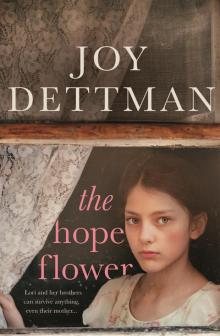 The Hope Flower
The Hope Flower Trails in the Dust
Trails in the Dust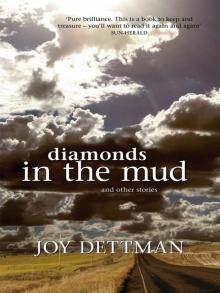 Diamonds in the Mud and Other Stories
Diamonds in the Mud and Other Stories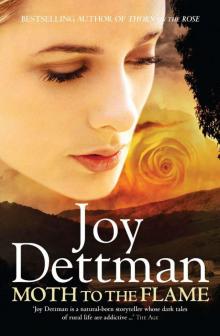 Moth to the Flame
Moth to the Flame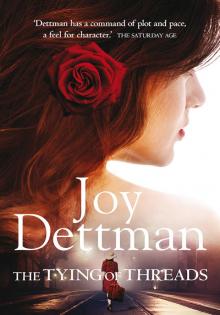 The Tying of Threads
The Tying of Threads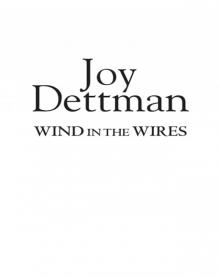 Wind in the Wires
Wind in the Wires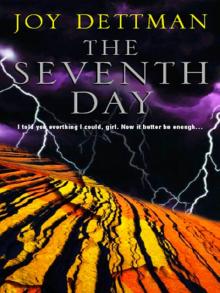 The Seventh Day
The Seventh Day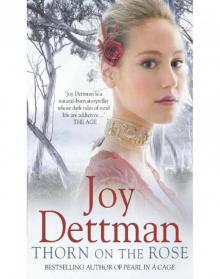 Thorn on the Rose
Thorn on the Rose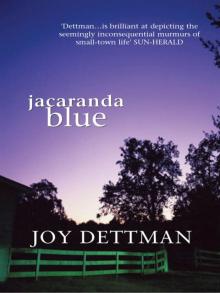 Jacaranda Blue
Jacaranda Blue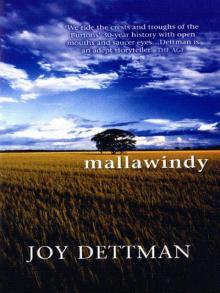 Mallawindy
Mallawindy Ripples on a Pond
Ripples on a Pond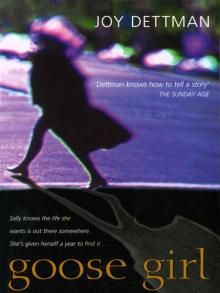 Goose Girl
Goose Girl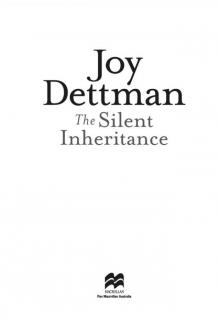 The Silent Inheritance
The Silent Inheritance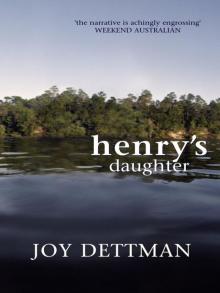 Henry’s Daughter
Henry’s Daughter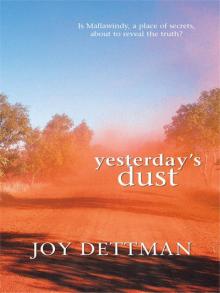 Yesterday's Dust
Yesterday's Dust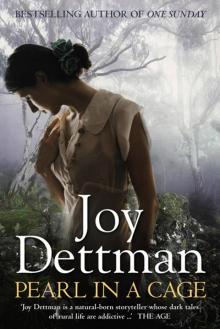 Pearl in a Cage
Pearl in a Cage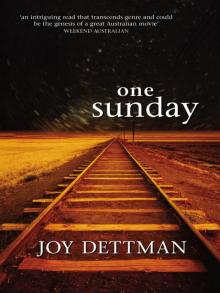 One Sunday
One Sunday